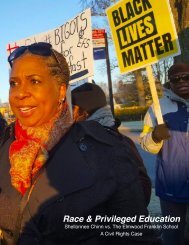A 163 Year Sentence
- No tags were found...
You also want an ePaper? Increase the reach of your titles
YUMPU automatically turns print PDFs into web optimized ePapers that Google loves.
Interviewing today<br />
The art of interviewing children in cases of child abuse has improved since 1992, in part to heed the<br />
lessons of the McMartin Preschool case from California and other injustices, in which parents and<br />
caregivers were locked away because of false or coerced testimony from children.<br />
In Erie County, most interviews are conducted not at police stations but inside a repurposed mansion on<br />
Franklin Street. The Lee Gross Anthone Child Advocacy Center, a unit of Child and Adolescent<br />
Treatment Services, opened in 1994, the year Okongwu, Wosu and Eze were packed off to prison.<br />
Interviewers are expected to, among other things, keep concepts simple; to avoid leading questions or<br />
questions that elicit only yes or no answers; to let children know it’s OK to answer with “I don’t know” if<br />
they don’t know; and to ensure they understand the difference between truth and lies.<br />
In their statements, the Okongwu twins said they were shut down any time they tried to retract the<br />
accusations and correct the authorities. Even today, a child who changes his or her story – who “recants”<br />
– faces skepticism because officials tend to assume the child feels pressure to change course.<br />
“When faced with a victim’s recantation, prosecutors should seek out evidence that will rehabilitate and<br />
corroborate the victim’s initial, truthful disclosure,” says a September 2011 article in “Strategies,” a<br />
newsletter for prosecutors. The article leaves little room for the possibility that the child’s latest<br />
statement is the truth.<br />
“There are instances again that we have seen where family members pressure the child to recant their<br />
allegations because they don’t want the breadwinner to be kicked out of the house and go to jail,” said<br />
Judith Olin, director of the child advocacy center. “And unfortunately children are often put under a lot<br />
of pressure in that regard. It is very sad.”<br />
Jeffrey Deskovic doubts that interviewing has improved much. He was convicted at 17 of raping and<br />
murdering a fellow high school student in Peekskill. After 16 years in prison, he was cleared by DNA<br />
evidence that identified the real killer, who meanwhile had murdered again. Once released, Deskovic<br />
earned bachelor’s and master’s degrees from the John Jay College of Criminal Justice and, with money<br />
received for his wrongful conviction, began a foundation in New York City that helps others serving time<br />
for crimes they did not commit.<br />
Naturally, police and prosecutors want to protect kids and want to know whether physical or sexual<br />
abuse occurred, Deskovic said, but the system often presumes guilt because of the revulsion triggered by<br />
sex crimes against children. Sometimes, he added, police and prosecutors are fueled by a “cosmic justice<br />
mentality’’: They believe their suspect breaks the law and want a conviction “for one thing or another” to<br />
get them off the street.<br />
It’s the very dynamic that Okongwu says was at play in his case. Officials believed he was guilty of abuse<br />
in 1988 but didn’t convict him. They were determined that the trial in 1993 would end differently.<br />
Sedita’s view<br />
Kevin M. Dillon, the district attorney when Okongwu was convicted, remembered little of the case. But<br />
today’s district attorney, Frank A. Sedita III, sees no miscarriage of justice. He said the women were<br />
asked after their father won his appeal to testify in a second trial. According to Sedita, the Okongwu<br />
twins did not claim they had been railroaded back in 1993. They even said their recent affidavits were<br />
false. Then they stressed that they would not testify again only because, Sedita said, they wanted to avoid<br />
reliving the matter.<br />
Sedita and his team adamantly deny that the girls were coached or coerced. They say the girls made clear<br />
statements to the authorities back in the early 1990s and the horrific details were strong enough to bring<br />
charges and take the case to trial.<br />
Stachowski, the lawyer who argued Okongwu’s final appeal, says he knows the women were truthful in<br />
their two sets of affidavits. The first was completed in 2010, after the appeal was won. The second came<br />
in 2013, after charges were dropped and their father prepared his lawsuit for the Court of Claims.<br />
Stachowski says the statements to the DA’s staff should not be taken as genuine. The women feared they<br />
would be charged somehow if they did not testify and wanted to free themselves from the prosecutors’<br />
demands, he said.<br />
“In late 2011, when I was 26 years old,” the women say in identical statements, “the Erie County District






